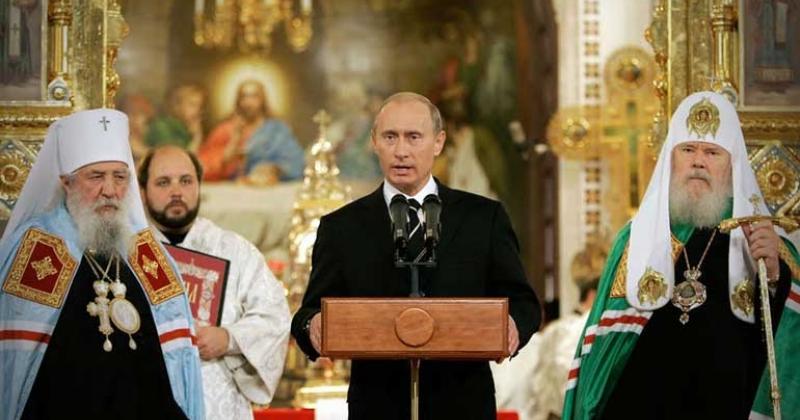The president of Russia points to “Christianisation” as the origin of the identity of the country, of its strength and its historical importance. Criticisms and warnings raised by those groups that in the past have firmly supported “cultural battles” to reaffirm the roots of the West.
Last Sunday, in the churches of Russia, Ukraine and other countries once included in the Russian Empire, many Christians celebrated the 1130th anniversary of the baptism of Prince Vladimir the Great in the waters of the Dnieper River, renewing their own baptismal promises too. Also the Russian president Vladimir Putin attended the anniversary of that historical event – celebrated as the beginning of the conversion to Christianity of the Eastern Slavs – and he strongly remarked that the “Christianisation” of the Grand Prince of the ancient Kievan Rus’ and his subjects also represents the founding act of “Russian statehood”, and the perennial root that nourishes the identity of the Russian people and its historical mission in the world.
Putin – who even bears the name of the ancient monarch baptised in Cherson in 988 – reaffirmed what he considers a visceral bond between Christianity and the Russian identity by attending the ceremony held on Sunday at the monument dedicated to the prince Vladimir, in Moscow, in the presence of Patriarch Kirill. The presidential speech, calibrated in every word, vigorously insisted on the “Christianisation” as the origin of the identity of Russia, of its strength and its historical importance.
Following the steps of the “Prince warrior”
The conversion to Christianity – Putin insisted in his speech – was “the starting point for the formation and development of the Russian statehood”, the true “spiritual birth” that determined the identity and self-awareness “of our ancestors”, and he also praised “the flowering of national culture and education”, favouring “multiform bonds with other countries”. Also the historical importance of the Russian people, according to Putin, does not find its roots in military victories or hegemonic drives, but in that event of “civil significance” and “transforming spiritual power” that “predetermined the centuries-old path of Russia and had an effect on its entire global development”. Praising the wisdom and foresight of the ancestors who “chose” Christianity of Byzantine tradition, Putin also focused on the figure of Prince Vladimir, the “warrior” who “faced fierce fights and trials”, and under whose guidance “churches, monasteries, cities, schools and libraries were built”, motivated by the intuition that Christianity would provide the moral support and the foundations for “consolidating the unity and identity of the peoples who inhabited the ancient Rus’”.
The “Christian” wave in a Russian version
The allusions contained in Putin’s speech on Prince Vladimir are not new. Similar words and concepts were expressed by “Tsar” Putin five years ago, when he could celebrate 1025 years since the conversion of Kievan Rus’ right in the capital of Ukraine, then ruled by his “fellow” President Viktor Yanukovich. Since then, after the Ukrainian crisis and the military intervention in Syria, the geopolitical importance of Russia and the relations with many NATO countries have changed. In the speeches of the Russian leadership and also of the most prominent members of the Patriarchate of Moscow – Patriarch Kirill and Metropolitan Hilarion – the tones of patriotic mysticism are accentuated, magnifying Russian Orthodoxy as the “soul” and the guardian of the pride of the national identity.
In western environments, warnings and criticisms increase towards the use of Christianity as a unifying factor of one’s own ethnic, cultural and civil identity. Yet, mutatis mutandis, the moods and lines of thought of the present Russian machinery of government show evident affinity with those used for decades also in the West by political and ecclesiastical sectors alike – from the “Action Française” to the neocon lobbies of North-Atlantic origin – to interpret and reduce the Christian dynamism to a religious principle of cultural identification.
During the Korean War, in his Christmas message of 1951, US President Harry Truman identified the desired triumph on the Korean front with the victory that the birth of Jesus brought to the world: “We will be strong so long as we keep that faith – he said, mainly addressing the soldiers of his country – the faith that can move mountains, the faith which, as Saint Paul says, is the substance of things hoped for, the evidence of things not seen. The victory we seek was promised to us long ago, in the words of the angel choir that sang over Bethlehem: «Glory to God in the highest, and on earth peace, good will toward men»”.
Certain keywords now in vogue in the Putinian leadership represent the Russian version of trends also present in other worlds. Identitarian impulses always exposed to the risk of counterfeiting Christian words in an ideological key or reducing them to factors of cultural production and inspiration.
Among the critics of the new pan-Russian mystical identitarianism also ecclesial and cultural sectors stand in the forefront, which, in recent decades, were enthusiastic militants of cultural battles to reaffirm the relevance of Christianity as the founding cultural root of Western civilization. A sign that perhaps the Russian identitarian impulses are unpleasant to many, above all, for reasons of a simple compliance with the balance of the forces within their own militancy. And because of “geopolitical” submissions.
